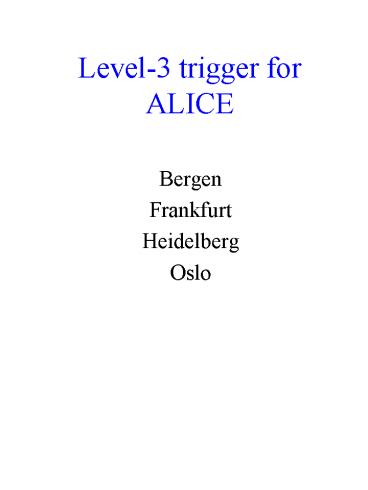Level3 trigger for ALICE
1 / 27
Title: Level3 trigger for ALICE
1
Level-3 trigger forALICE
- Bergen
- Frankfurt
- Heidelberg
- Oslo
2
Assumptions
- Need for an online rudimentary event
reconstruction for monitoring - Detector readout rate (i.e. TPC) gtgt DAQ
bandwidth ? mass storage bandwidth - Some physics observables require running
detectors at maximum rate (e.g. quarkonium
spectroscopy TPC/TRD
dielectrons jets in pp TPC tracking) - Online combination of different detectors can
increase selectivity of triggers (e.g. jet
quenching PHOS/TPC high-pT ? - jet events)
3
Data volume and event rate
bandwidth
TPC detector data volume 300 Mbyte/event data
rate 200 Hz
60 Gbyte/sec
front-end electronics
15 Gbyte/sec
Level-3 system
lt 2 Gbyte/sec
DAQ event building
lt 1.2 Gbyte/sec
permanent storage system
4
Dielectrons
- Dielectron measurement in TRD/TPC/ITS
- quarkonium spectroscopy needs high rates
- TPC must operate at gt100 Hz
- TPC data rate has to be significantly reduced
- TRD pre-trigger for TPC
- level-3 trigger system for TPC
- partial readout
- eeverification event rejection
level-3 trigger system
TRD _at_ 2kHz
TPC _at_ 200 Hz
Online track reconstruction 1) selection of
eepairs (ROI) 2) analysis of
eepairs (event rejection)
5
Event flow
Event sizes and number of links TPC only
6
Level-3 tasks
- Online (sub)-event reconstruction
- optimization and monitoring of detector
performance - monitoring of trigger selectivity
- fast check of physics program
- Data rate reduction
- data volume reduction
- regions-of-interest and partial readout
- data compression
- event rate reduction
- (sub)-event reconstruction and event rejection
- pp program
- pile-up removal
- charged particle jet trigger
7
Online event reconstruction
- Optimization and monitoring of detector
performance - see STAR online tracking
- Monitoring of trigger selectivity
- see STAR event rejection by Level-3 vertex
determination - Fast check of physics program
- see STAR peripheral physics program
has to be up and running on day 1
8
Data rate reduction
- Volume reduction
- regions-of-interest and partial readout
- data compression
- entropy coder
- vector quantization
- TPC-data modeling
- Rate reduction
- (sub)-event reconstruction and event rejection
before event building
9
TPC event(only about 1 is shown)
10
Regions-of-interest and partial readout
- Example selection of TPC sector and ?-slice
based on TRD track candidate
11
Data compressionEntropy coder
Probability distribution of 8-bit TPC data
- Variable Length Coding
- short codes for long codes for
- frequent values infrequent values
- Results
- NA49 compressed event size 72
- ALICE 65
- (Arne Wiebalck, diploma thesis, Heidelberg)
12
Data compressionVector quantization
- Sequence of ADC-values on a pad vector
compare
code book
- Vector quantization transformation of
vectors into codebook entries - Quantization error
Results NA49 compressed event size 29
ALICE 48-64 (Arne Wiebalck, diploma
thesis, Heidelberg)
13
Data compression TPC-data modeling
- Fast local pattern recognition
simple local track model (e.g. helix)
track parameters
- Track and cluster modeling
comparison to raw data
local track parameters
analytical cluster model
quantization of deviations from track and
cluster model
Result NA49 compressed event size 7
14
Fast pattern recognition
- Essential part of Level-3 system
- crude complete event reconstruction
- ? monitoring
- redundant local tracklet finder for cluster
evaluation ? efficient data compression - selection of (?,?,pT)-slices
- ? ROI
- high precision tracking for selected track
candidates - jets, dielectrons, ...
15
Fast pattern recognition
- Sequential approach
- cluster finder, vertex finder and track follower
- STAR code adapted to ALICE TPC
- reconstruction efficiency
- timing results
- Iterative feature extraction
- tracklet finder on raw data and cluster
evaluation - Hough transform
16
Fast cluster finder (1)
- timing 5ms per padrow
17
Fast cluster finder (2)
18
Fast cluster finder (3)
- Efficiency
- Offline efficiency
19
Fast vertex finder
- Resolution
- Timing result
- 19 msec on ALPHA (667 MHz)
20
Fast track finder
- Tracking efficiency
21
Fast track finder
- Timing results
22
Hough transform (1)
- Data flow
23
Hough transform (2)
- ?-slices
24
Hough transform (3)
- Transformation and maxima search
25
Level-3 system architecture
TPC sector 1
TPC sector 36
TRD
ITS
XYZ
ROI
local processing (subsector/sector)
data compression
global processing I (2x18 sectors)
Level-3 trigger
jets
dielectron verification event rejection
global processing II (detector merging)
global processing III (event reconstruction)
monitoring
26
Level-3 implementation scenariosA
B
Detectors
Detectors
(sub)detector 1 2 n
Level-3
DAQ-EVB
event 1 2 n
Level-3
DAQ-EVB
- simple architecture
- trivial parallel processing
- throughput always limited to 10-20 Hz due to
bandwidth limitation - cannot fulfill all Level-3 requirements
- minimized data transfer
- scalable distributed computing farm (500-1000
nodes network) would do the job
27
Conclusion
- Need for online (crude/partial/sub) event
reconstruction and event rejection - Essential task fast pattern recognition (TPC)
- Distributed computing farm (500-1000 nodes) close
to the detector readout would do the job



























![❤️[READ]✔️ Alice Waters Cooks Up a Food Revolution](https://s3.amazonaws.com/images.powershow.com/10070674.th0.jpg?_=20240703128)
![❤[PDF]⚡ Alice & Eiffel: A New History of Early Cinema and the Love Story Kept Secret](https://s3.amazonaws.com/images.powershow.com/10072943.th0.jpg?_=20240704119)
![get⚡[PDF]❤ Alice in Wonderland: The Official Cookbook (Disney)](https://s3.amazonaws.com/images.powershow.com/10079468.th0.jpg?_=20240716112)

